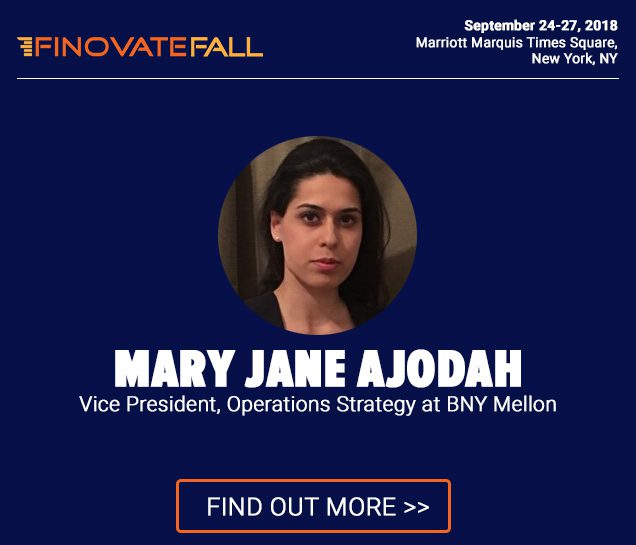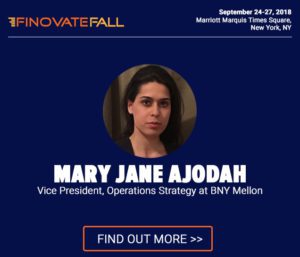Mary Jane Ajodah covers fintech and emerging technology within the Client Service Delivery Strategy Group at Bank of New York Mellon. Her responsibilities entail developing use cases for emerging technology with various business areas, identifying and driving opportunities for partnerships with third parties, and articulating a strategic vision around new technology for operations. Ahead of her session at FinovateFall – Industry Discussion: Transforming Legacy Businesses with AI – Building win-win Partnerships while Focusing on Utility, Practicality and Efficiency – we speak to her about her career path and her words of advice to the future women in fintech.
Finovate: How did you start your career?
Mary Jane Ajodah: I started my career in IBM’s internal strategy consulting practice. I worked on several projects core to IBM’s reorganization and transformation, including the launch of the IBM Digital business unit. I gained invaluable experience at IBM, particularly around how innovation and change are executed in a mature enterprise.
In late 2015, a recruiter from BNY Mellon reached out to me on a role focusing on fintech within the bank’s Operations Strategy team. Around this time, interest in topics such as ‘enterprise blockchain’ and AI was accelerating, with a great deal of discussion around the future role of custodians and other financial intermediaries. It was a unique opportunity and key point in time. Since joining, I’ve worked on a number of projects related to BNYM’s overall growth and innovation strategy. I’ve also appreciated the opportunity to cultivate our relationships with startups and VCs where there is mutual benefit.
The recurring theme for both of these roles has been driving change within enduring organizations (IBM at 100+ years, and BNY Mellon at 234 years). Mostly, I’ve been fortunate to have learned from inspiring senior leaders, and to have worked with excellent teams.
Finovate: What sparked your interest in fintech?
Ajodah: I was interested in both finance and technology separately, and my current role brings both together. I studied economics and international relations at NYU, and wrote my undergraduate honors thesis on sovereign debt and default. As I started my career, I wanted to ensure I had a skill set that would endure over the long-run – understanding the impact of technology on changing business models is a core component.
Finovate: What was your lightbulb moment?
Ajodah: I’ve had a few lightbulb moments on specific projects during my career, generally uncovering some root cause or issue and proposing a solution after interviews with various stakeholders and subsequent analyses. It is very rewarding when those moments happen.
Finovate: What inspires you?
Ajodah: Travel inspires me the most. I like to do a lot of solo travel, and have visited a lot of cool places. I visited Svalbard, the last human settlement before the North Pole, when it was 24 hours of night. This trip inspired an Off-Broadway show that I wrote and produced this past July — “Savage Force”. We sold out for all the nights of our run.
I am inspired the most by those that can be successful in multiple fields of endeavor – Fridtjof Nansen – who discovered most of the Arctic, along with being a scientist and diplomat, is one of them!
Finovate: Why is the #WomenInTech movement important?
Ajodah: My generation has tremendous opportunities thanks to the success and contributions of the women of generations prior. During the time I spent both at IBM and BNY Mellon, there have always been senior women at the highest levels of management with tremendous energy, experience, and knowledge.
Finovate: What piece of advice would you give women starting their careers in fintech?
Ajodah: View your career as a marathon, not a sprint. The ability to contribute consistently and effectively over time, and put in the intensity where it is truly needed is crucially important.

